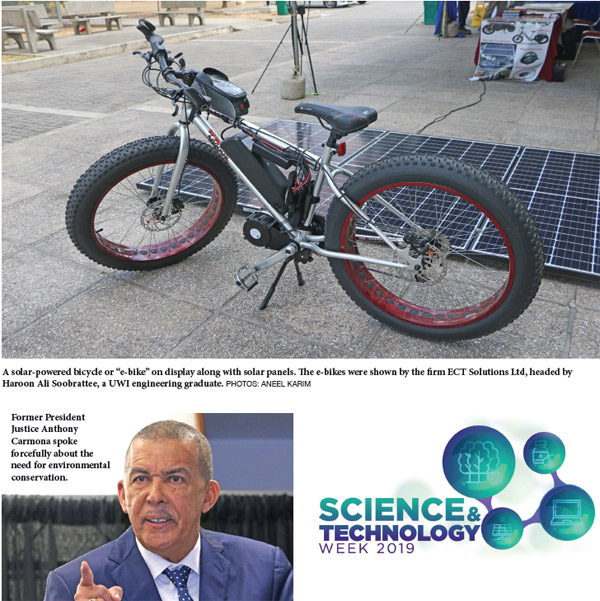
 “Science in Communities”, FST’s week-long exhibition showcased innovative products and services, including alternative energy, industrial and laboratory equipment, computer equipment, medical supplies and more. “Science in Communities”, FST’s week-long exhibition showcased innovative products and services, including alternative energy, industrial and laboratory equipment, computer equipment, medical supplies and more.
Each day of Science and Technology Week was filled with presentations on a wide range of research areas. Various departments, as well as partners and sponsors, showed their stuff at informative and interactive booths, with visiting secondary school students especially in mind. All sessions were free and open to the public.
At the opening ceremony, chaired by DrRicardo Clarke, Deputy Dean of Graduate Studies, Research and Innovation in FST, participants were told about the aims of the expo.
Focusing on the “Science in Communities” theme, FST Dean Dr Brian Cockburn said the Science and Technology Week was all about “embracing innovation”, while encouraging the idea of “learning science outside the classroom or the lab... through community engagement”.
He made reference to American writer and futurist Alvin Toffler’s famous quote: “The illiterate of the 21st Century will not be those who cannot read and write, but those who cannot learn, unlearn, and relearn,” stressing the need for a more relevant mode of research and study.
He said his faculty was in the business of “training students for jobs that have not yet been invented,” because modern living was creating new and unforeseen needs. But he assured: “A science education is a portable toolkit,” allowing for adaptability.
“With a solid scientific foundation,” he said, “our graduates will be ready.”
UWI Deputy Principal Professor Indar Ramnarine congratulated FST team on its Science and Technology Week initiative, expressing his hope that it would be the first of many annual events.
He said there was a need to align the University’s educational programmes with the needs of society, such as green technologies, climate change amelioration and, most importantly, more sustainable agricultural production. He said the issue of increased crop productivity was crucial, and he was proud to note that some of the Faculty’s work was in the food production field.
He said the Science and Technology Week would “make the case to secondary school students,” and infuse them with the same passion for innovation.
Dr Patricia Mohammed, Director of Graduate Studies and Research, praised the community focus of the exposition, remarking that there was a lingering perception that the University was an “ivory tower”, “disconnected from the real problems of society”.
But she said UWI was evolving to ensure that subject matter for research came “directly from the community”, and that methods of data collection and the process of communicating findings were more integrated with the public.
Former President of the Republic of Trinidad and Tobago Justice Anthony Carmona advocated for climate change amelioration as a focus of development.
He said “a role should be played by the University in helping to meet with the United Nations’ sustainability goals, especially as “these outcomes have huge potential to change people’s lives in the foreseeable future.
He focused on the need to ensure a reliable supply of potable water as a pillar of industrial development and as a basic human right.
Terry Mohammed, FST Deputy Dean of Outreach, described the week's schedule in which each day covered a different theme. The focus on the first day was on Climate Change, Disaster Preparedness and Management, Environmental and Earth Sciences; Tuesday, Data Application andits Management and Security, and Information Technology. The spotlight fell on Energy, Fuels, Green Technology, and Renewables on Wednesday; and on Health, Safety, Medicine and Medical Technology, Pharmaceuticals, and Wellness on Thursday. The highlight of Friday’s presentations was a panel discussion on “Cannabis – the Science and the Issues”, culminating in a closing ceremony.
Participants were encouraged to visit the display booths mounted by different departments and sponsors.
The Department of Mathematics and Statistics had their area set up with logic and pattern games and a maze to engage visiting students, along with information on different career paths available to the Mathematics graduate.
VH Marketing Ltd’s booth showed some of the medical equipment they supply, “from latex gloves to CT scan machines”, as well as equipment for industry, science and school labs, along with a line of wellness products.
Owner Keegan Harricharran said partnering with the event was an “opportunity to invest in T&T by investing in UWI’s graduating students”, as well as to offer internship possibilities with a chance “for graduating students to find a job in their field”.
In-Corr-Tech Ltd showcased their construction services, including a Scanning Electron Microscope and metallurgy lab in San Fernando.
The Seismic Research Centre’s spin-the-wheel game gave visitors a chance to answer questions and win prizes, while the Department of Physics displayed a solar energy-powered circuit to show how clean energy can power the future.
The Department of Life Sciences’ National Herbarium of Trinidad and Tobago showed a selection of native flora with some rare fruit like “fat pork” and pois doux, along with information about their free school tours at their Sir Frank Stockdale Building.
They shared a space with the UWI Zoological Museum, whose display included taxidermy models of indigenous animals like bats, squirrels, spiders and birds.
Over the period, student and staff researchers showed over 40 multimedia presentations of their studies and findings. |





